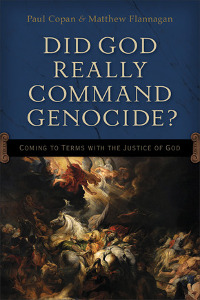Paul Copan and Matthew Flannagan, Did God Command Genocide?: Coming to Terms with the Justice of God (Grand Rapids: Baker, 2014), 353 pages. (Electronic copy reviewed here)
I’ve been curious to see this one ever since my good friend Matt Flannagan told me that he and Paul were going to be writing it.
Knowing Matt as I do, I feel pretty safe in saying that the move to write this book started from arguments about God as the basis of morality. Moral truths point to a moral law-giver, and a divine command theory (in which moral obligation is tied closely to God’s commands) is the best account of moral duty. But what then, some – like Raymond Bradley – ask, do we make of the biblical accounts of conquest and slaughter in the Old Testament? Can you really believe that this God is the perfectly good, loving personal basis of all moral duty? Strictly speaking we can just bat the question away, because the moral argument for theism and a divine command theory of ethics do not commit us to saying anything about what we find in the Bible. But it is an elephant in the room. If we are Christians, then that is the God we believe in, so when we talk about an argument for God’s existence or about God’s commands, this is the God we mean. At some point then we’ll need (or at least we would certainly like) a way of addressing the concern that what we find in the Old Testament accounts of Israel’s conquest of the land of Canaan and the killing of its inhabitants is incompatible with the goodness of God.

